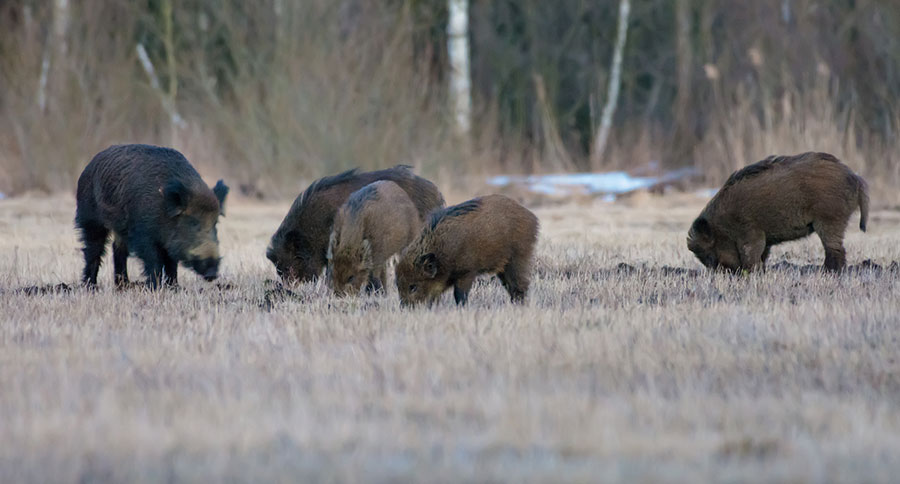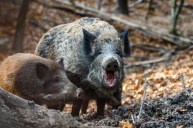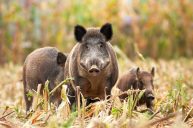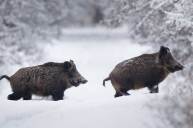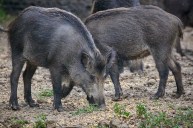Attitudes on hogs are very different in the north as opposed to the views on them in the south.
Feral swine are a nuisance animal in many parts of the south. Especially Texas where the hunting of feral hogs isn't so much a sport of meat-gathering endeavor, but a simple struggle to keep them from completely taking over.
While the southern United States may be sick of this invasive species, one finds a slightly different attitude in the north.
Today we'll look at feral pigs and the very different attitudes towards hog hunting depending on where in the U.S. you are.
Everything is bigger in Texas (Especially the wild hog problem!)
According to the Texas Parks and Wildlife Department, it is believed pigs were first introduced to Texas by early Spanish explorers. Over the next 300 or so years, the problem has blossomed. Now the feral hog population is estimated to exceed 1.5 million animals.
Wild pigs are incredibly adaptive to just about any terrain. They eat anything and everything, even young whitetail fawns. Their sense of smell is almost unmatched and a group of hogs can completely annihilate a farmer's freshly planted field in a single night.
And we haven't even gotten into how fast they're re-populating. It's estimated that Texas hunters are eliminating 30 percent of the population every year. But it still isn't enough. Hog numbers in the Lone Star state are increasing by 20 percent every year!
Texas doesn't consider hogs to be a big game animal, and the only requirement to hunt them is a proper hunting license. Other than that, it's pretty much been a free-for-all when it comes to control methods. No hunting season, no bag limit, and no legal shooting hours. You can use any weapon, in any caliber, all year-round.
It's gotten so crazy in Texas that businesses have sprung up that take people out shooting hogs from helicopters. A few years ago, the state legalized hunting hogs out of a hot air balloon. At this point, we're pretty sure Texas would let people drop anvils out of airplanes onto wild boars if officials thought it would knock the population down a few pegs!
Attitudes in the south
Through all this, it seems as if some people in the south are getting a little pig-weary at this point, and especially so for the deer hunting enthusiasts who are sick of their food plots getting uprooted and fawns getting killed. Turkey hunters cross their fingers and hope the hogs don't eat all the turkey eggs each spring.
Farmers in the south have begrudgingly become hog hunters, sitting over their fields at night with a night vision thermal scope fitted to an AR-10. They are forced into night hunting, not because they want to, but to protect their livelihood. It's either that or pay someone else to do it for them.
An invasive species this bad gives headaches to people in wildlife management (not to mention the USDA) as they struggle to come up with new ways of reducing the strain on natural resources and agriculture.
Last September, I flew to Texas to report on an unrelated rodeo story and it was interesting to talk to the locals about wild hogs. It's becoming common practice for the locals to grab their neighbors and sneak out to the fields at night with their rifles when they see a big group. Sometimes these neighbors team up just so they can get as many bullets as possible flying down range to try and wipe these large groups out.
In the case of the professional rodeo star I interviewed, killing the hogs was important because stepping in a hole rooted by hogs could easily snap the leg of his valuable competition horses.
That was a rather unique hog problem. But sadly, I'm not sure the many varied problems wild hogs bring have gotten to those of us living in northern states.
Attitudes in the north
I lived in Michigan almost all my life, except for one very brief stint in Wyoming. One thing is for sure, many hunters in the Midwest would love to have more animals to hunt. We have an estimated 1.75 million deer and probably around half a million hunters.
The hunting pressure in Michigan is intense. Too intense, in fact. You'd better hope you get that big buck on the ground on or before the start of firearms season on November 15, because odds are, you won't see them again until the season ends. The pressure is so thick that the deer just do not act natural after that date.
I always knew Michigan was a difficult, sometimes outright frustrating place for deer hunters. But I didn't realize how different things could be until I lived in Wyoming and saw a Boone & Crockett class whitetail feeding in an open field at 11 in the morning the day before Thanksgiving. You wouldn't see that during the summer months, much less during hunting season, anywhere in Michigan. That's how pressured and scared the deer are.
Unfortunately, whitetail deer in Michigan are about it as far as big game goes. You can apply for an elusive elk permit, but your odds of getting one are low. And even if you do, once you bag a bull, you're done for life. There's moose in Michigan, but they're so rare they may never be hunted here ever again.
Oh, and because we have so many hunters, public land is often overrun. Thus, many hunters shoot the first deer they see and ask questions later. Usually it's only those with private land can afford to be selective.
Sadly, Michigan wants badly to be a big buck state, but the pressure is so great and the deer so small, that a 100-inch buck is considered the trophy of a lifetime in many areas.
Why do I mention all this? Simply because Michigan hunters, and many others in the Midwest, are starved for new big game hunting opportunities. So, believe it or not, there really are Michigan hunters who would love for wild hogs to be here so they could have something else to hunt. I've talked to some of them in person.
It's not that they want all the agricultural and biological problems that come with the hog invasion, or that they're ignoring those factors. Some hunters here even recognize that these animals are a real, significant problem. They just wish they had something else to hunt.
Short of deer and turkey, most Michigan hunters don't pursue much beyond that. After you've watched a bunch of exotic hunts on Outdoor Channel and YouTube, hunting in some Midwestern states can seem kind of bland by comparison.
The drastic difference in attitudes between states
During my short stint in Wyoming, one of my co-workers shocked me one day when he referred to whitetail deer as "trash deer." That would be blasphemy in Michigan. But in Northwest Wyoming, hunters are usually after elk first, mule deer second, and if they can't get either of the first two, THEN they might consider shooting a whitetail. They simply have more options.
The whole thing really opened my eyes to how we as hunters are as different as we are similar. From state to state and region to region, priorities and hunting attitudes are as different as the antlers on a whitetail and a mule deer.
I'm sure some Texas and other southern states hunters are probably quick to label hunters in northern states who want wild hogs as fools or idiots. I think that's going a little too far; the people who want these things simply don't know any better.
They just want something else to hunt. Let's say you live in Louisiana, Florida, or Mississippi, somewhere near the Gulf of Mexico. If you could have elk or pronghorn to hunt in these areas, would you reject it? Probably not.
And it's not a shared sentiment across all northerners, either. It seems like some of those in charge, such as the Wisconsin DNR, want nothing to do with them. It's the less educated on the subject that seem to think otherwise.
Most of the hunters in the north who want wild hogs just want some wild, free-ranging pork in their freezer. Can you blame them? When prepared correctly, wild hog is delicious.
I guess the whole point I'm trying to make here is this: If you want wild hogs in a northern state, please do your homework first to realize what a bad idea this is.
If you're a southerner shaking your head at us Yankees, don't hate on hunters who don't know better. You might be surprised at how different our perspectives all are based on where we live. I simply suggest you educate the hunters who don't know better. Respectively please. After all, we all just want more and better hunting opportunities.
For more outdoor content from Travis Smola, be sure to follow him on Twitter and check out his Geocaching and Outdoors with Travis Youtube channels.
NEXT: VIDEO: RIDE ALONG WITH LUNKERSTV ON A TEXAS HELICOPTER HOG HUNT
WATCH
